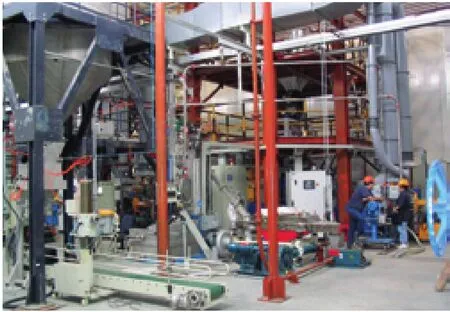New Life for Old Plastics Recycling joint venture utilizes innovative technology to reuse plastics
2011-10-14ByLIUXINLIAN
By LIU XINLIAN
New Life for Old Plastics Recycling joint venture utilizes innovative technology to reuse plastics
By LIU XINLIAN
Recycling, despite its green connotations, can be a messy business. In China, more than 400,000 companies are engaged in plastic recycling, but 70 percent of them are family enterprises, said Chen Guirui, CEO of Hangzhou-based zz91.com, a website focusing on recycling. A lack of advanced technologies and facilities has caused many to blame the industry for producing unnecessary pollution as it tries to provide recycling services.
The Guangzhou GISE-MBA New Plastics Technology Co. Ltd. (GMP) has risen to meet the challenge of processing mixed plastics using eco-friendly technologies and hi-tech recycling facilities. The company, established in 2004, is a joint venture between MBA Polymers Inc. from the United States and Guangzhou Iron and Steel Enterprises Holdings Ltd. (GISE).
“China is the second largest consumer of plastics in the world. Its need for plastics is also growing faster than anywhere else in the world,” said Mike Biddle, President and founder of MBA Polymers. “Rather than build expensive and energy-consuming chemical plants, our company provides a way for China to make the plastics it needs, but at signifcantly lower economic and environmental costs,” he said.
GMP, with a staff of 160 and a total investment of $15 million, is located in Guangzhou, capital of south China’s Guangdong Province. Its operations turn shredded plastic components in computers, televisions, refrigerators and other products into pellets that are as useful as virtually any freshly produced plastics.
“Our post-consumer-recycled plastics from scrap of durable goods, such as home appliances and electrical equipment, is not inferior to virgin plastics made from oil. Most of them have been used by worldacclaimed appliance and electric equipment makers,” said Eric Wang, Managing Director of GMP and Director of China Operations of MBA Polymers.
California-based MBA Polymers, which owns 55 percent of the joint venture, is the world leader in recycling plastics from durable goods that no longer work or have been thrown out.
GISE, which owns 45 percent of the joint venture, is the largest steel producer in south China. It was also the frst company in China to establish a metal shredding and recycling operation and is the largest importer of scrap steel in south China.
There are more than 40 types of plastics on the market, each with different properties. To create a recycled product matching the quality of virgin plastics, MBA Polymers cobbled together techniques from a variety of industries into a multi-step automated process that separates plastics from non-plastics, then plastics by type and grade.
GMP’s pellets are cost-effective and create environmental sustainability because manufacturing them requires less than 10 percent of the energy needed to make new plastics. Making the pellets doesn’t require oil, which has risen in price in recent years, as is the case with newly produced plastics, Wang said.
The company isn’t the only winner in this process—the environment gets to share in the prize. Every pound of virgin plastics that is recycled keeps two or three pounds of greenhouse gas emissions out of the atmosphere. It also alleviates the demand for more landflls as current ones fll up, Wang said.
With an annual processing capacity of 40,000 tons of shredded plastics, GMP is able to cut greenhouse emissions of around 100,000 tons and reduce imported crude oil by 120,000 tons.
One of GMP’s biggest challenges is overcoming the misconception that recycled products are poorer in quality than newly produced ones.
Last year, GMP’s post-consumer-recycled plastics were used in vacuum cleaners produced by Electrolux, the world’s leading appliance company. Also GMP’s post-consumer-recycled plastics are in high demand by world leading electrical OEM companies to produce goods like printers, TVs, DVD players and computers.
Three years after opening, GMP began reaping solid profits as its market recognition increased. “Now we are doing well and plan to open our second factory in China,” said Wang.
Differing from family-run enterprises, GMP has its own water treatment system to process the waste water produced from plastic recycling.
Another hurdle has been fnding enough post-consumer plastics in China, according to Wang.
China’s need for plastic materials has grown in recent years due to rapid economic growth, causing the country to look abroad for discarded plastic products. China imported more than 8 million tons of discarded plastics in 2010. Nearly 70 percent of global plastic scrap now goes to China, said Ma Zhanfeng, Secretary General of China Plastic Processing Industry Association.
While many discarded durable goods are picked over for their valuable components and metals, there has never been much of an economic incentive to aggregate the massive volume of cheap plastics that remains. Some plastic recycling has been around for years, but it mostly involves much simpler materials, such as soda bottles and plastic bags.
What’s more, China does not have a recycling law like the EU and Japan that requires electronics and appliance manufacturers to pay for their products’ recycling and disposal.
“I think a couple of years from now, China’s discarded appliances will begin to be environmentally recycled more often, rather than being thrown away,” said Wang.

COURTESY OF GMP
